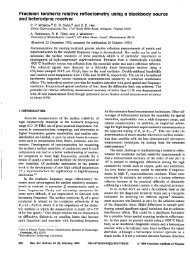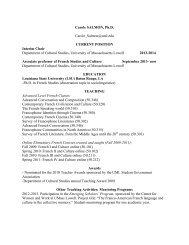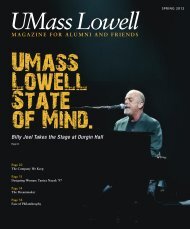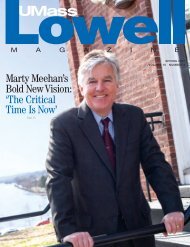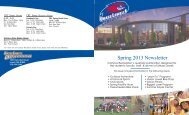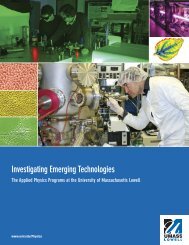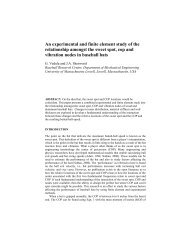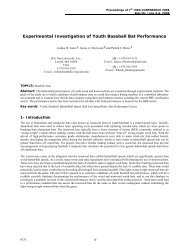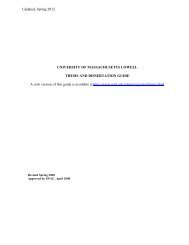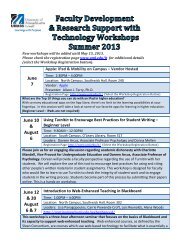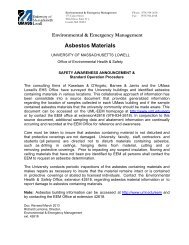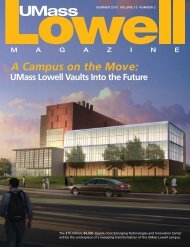comprehensive campus transportation plan - University of ...
comprehensive campus transportation plan - University of ...
comprehensive campus transportation plan - University of ...
Create successful ePaper yourself
Turn your PDF publications into a flip-book with our unique Google optimized e-Paper software.
<strong>University</strong> <strong>of</strong> Massachusetts Lowell Campus Transportation Plan<br />
B. Transportation Demand Management (TDM)<br />
UMass Lowell understands the need for safe and efficient <strong>transportation</strong><br />
systems and the ability for all user groups – students, faculty, staff, and<br />
visitors – to have multiple choices for movement around <strong>campus</strong> and to<br />
access UMass Lowell as a destination. Transportation Demand<br />
Management (TDM) is the art <strong>of</strong> influencing travel behavior for the purpose<br />
<strong>of</strong> reducing the demand for single occupant vehicle use. It is not only a<br />
crucial component <strong>of</strong> a balanced and sustainable <strong>plan</strong>, but can yield<br />
positive return for UMass Lowell with relatively modest investment.<br />
This <strong>plan</strong> recommends tools and mechanisms to better link <strong>transportation</strong><br />
and land uses to affect a more efficient and sustainable <strong>transportation</strong><br />
system over near-, mid-, and longer term <strong>plan</strong>ning horizons.<br />
The goal <strong>of</strong> the TDM program is to reduce single-occupancy vehicle (SOV)<br />
commuting thereby reducing parking demand, congestion, and associated<br />
environmental impacts. The TDM <strong>plan</strong> also supports enhancement <strong>of</strong><br />
inter- and intra-<strong>campus</strong> mobility by promoting walking, bicycling and use<br />
<strong>of</strong> transit. As such, the TDM Plan overlaps with other key <strong>plan</strong> elements<br />
- parking demand and supply and infrastructure improvements.<br />
UMass Lowell’s Department <strong>of</strong> Parking and Transportation has been<br />
advancing TDM informally for the past year; however, these programs are<br />
very new, have yet to mature, and would benefit from additional marketing.<br />
Part <strong>of</strong> the UMass Lowell Campus Transportation Plan is to work formally to<br />
define and advance its TDM initiatives, in support <strong>of</strong> <strong>University</strong><br />
sustainability and <strong>transportation</strong> initiatives.<br />
Benefits <strong>of</strong> Reducing Drive Alone Commuting<br />
There are many benefits in reducing drive-alone commuting to UMass<br />
Lowell, ranging from financial to health advantages for people individually<br />
and as a <strong>campus</strong> on the whole. Table 7 presents some <strong>of</strong> these benefits.<br />
Table 7 Benefits <strong>of</strong> Reducing Drive Alone Commuting<br />
TRANSPORTATION<br />
••<br />
Reduce peak period traffic<br />
congestion<br />
••<br />
Reduce parking demand<br />
••<br />
Reduce personal travel costs<br />
UNIVERSITY<br />
••<br />
Manage land-use<br />
••<br />
Support broader university/<br />
environmental policies<br />
Challenges to Implementing TDM<br />
SOCIAL<br />
••<br />
Increase choice<br />
••<br />
Develop a more livable<br />
community<br />
••<br />
Improve health<br />
••<br />
Change behavior and lifestyle<br />
ENVIRONMENTAL<br />
••<br />
Lower GHG emissions<br />
••<br />
Save energy<br />
There are challenges to modifying travel behavior. The desire for<br />
convenient, reasonably priced parking can currently be satisfied for many.<br />
Until there are incentives or deterrents for altering behaviors, drivers will<br />
likely not change. UMass Lowell also has a distinctly urban <strong>transportation</strong><br />
context. As such, there are several challenges to implementing a successful<br />
TDM program including an historic auto culture, sensitivity to increasing<br />
parking prices, an unwelcoming pedestrian and bike environment, the<br />
challenge coordinating with the LRTA, and the current fiscal environment.<br />
While there are challenges to implementing an effective TDM <strong>plan</strong> at UMass<br />
Lowell, it can certainly be accomplished. The following are keys to<br />
implementing a successful TDM program:<br />
••<br />
Provide <strong>comprehensive</strong> <strong>plan</strong><br />
••<br />
Support <strong>University</strong> vision and policies<br />
••<br />
Tailor for different land uses and user groups<br />
••<br />
Couple with parking management<br />
••<br />
Encourage investment in and use <strong>of</strong> alternative modes<br />
48<br />
Vanasse Hangen Brustlin, Inc.



